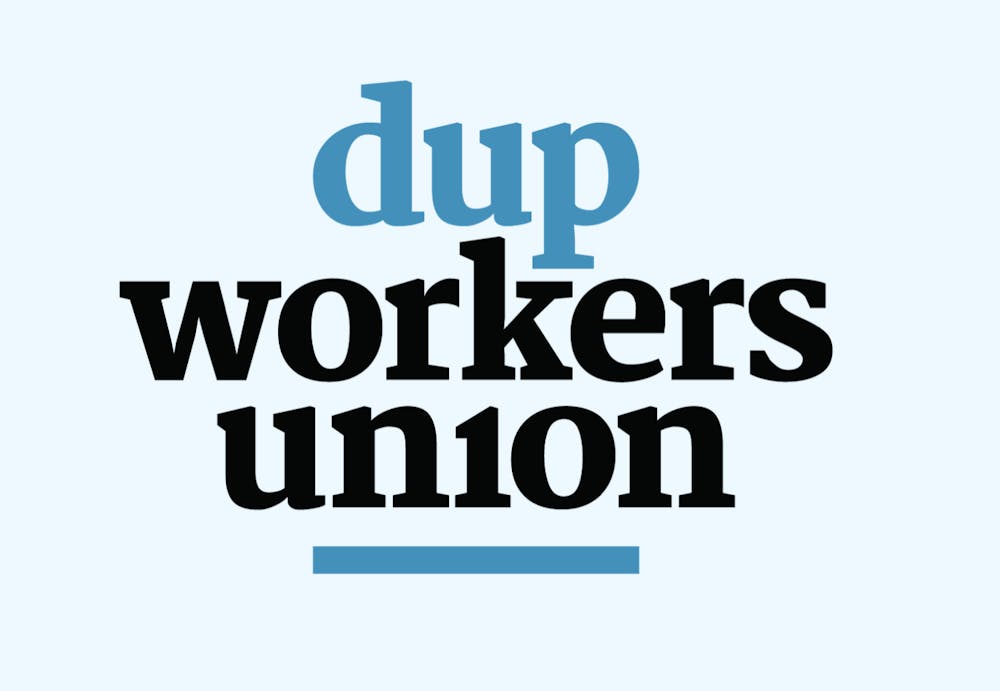Following an election to legally certify the Duke University Press Workers’ Union, Duke and DUP leadership are petitioning to overturn the results and hold a re-run election.
The DUP Workers Union first went public in March, though Duke did not voluntarily recognize the union. Seeking legal certification, the union filed for a National Labor Relations Board-conducted election in May. Ninety-six percent of eligible employees voted in the election, according to an open letter sent from the union to Duke and DUP management.
The vote count was held over Zoom on June 29. Preliminary results were 35 in favor of unionizing, 31 against.
A week after the vote count, however, lawyers representing the University petitioned the National Labor Relations Board for a re-run election, citing “administrative failures in the mail ballot process” and technical issues during the ballot count that resulted in “determinative challenged ballots.”
Missing stamps and Zoom glitches
Duke’s objections to the election included the NLRB’s failure to add return postage on its mail ballot envelopes and the NLRB’s decision to reset the mail ballot deadline and vote count date “without agreement of the parties.”
“We were definitely notified [of the new date],” said Kelsea Smith, an assistant managing editor at DUP. “Duke did not raise any objections at the time that a new notice of election was sent, so everyone had every reason to believe that we were proceeding as if we were in agreement and it was fine.”
Duke also claimed the new deadline provided “insufficient additional time to remedy the absence of return postage on initial mail ballot return envelopes.”
“We had people going on vacation and being out of town for periods of the vote time and they were still able to get their ballots in before they left. There was definitely sufficient time,” said Smith.
Smith pointed to the 96% voter turnout as an indicator that the initial lack of return postage “clearly didn’t have a huge impact” on people’s ability to vote on time.
Other objections focused on technical issues that caused the NLRB agent counting the votes to leave the three and a half hour-long Zoom meeting for seven to 10 minutes, thus “removing ballots and ballot envelopes in various stages of processing from the parties’ view.”
Aimee Harrison, a book designer at DUP, explained that during the vote count, the agent would open an envelope, hold up the ballot to show everyone, and then put it in a pile.
“There wasn’t, in my mind, room for her to change what was written because we were counting as they were opened and then tallied them all again at the end to confirm,” Harrison said.
At the time of the glitch, Duke did not raise any concerns, even though they had the opportunity to and had raised objections at other moments during the meeting, Harrison continued.
Duke’s last objection claimed the agent lost audio connection with the meeting for five to seven minutes, which caused the preference of at least two ballots to be unheard.
According to Smith, even though there was no audio, the agent held the ballots up to the screen and Zoom participants could see the two ballots clearly.
“It was a really long Zoom meeting, I would have thought technical glitches would be expected,” Smith said. “It doesn’t seem to us like a valid reason to toss our entire election.”
“Duke’s lawyer did ask the NLRB agent to pause and go through those [ballots] that had happened while [audio] was out,” Harrison said. “So it felt like they had verbally addressed it and that got resolved in the meeting.”
Some DUP employees, however, think Duke’s re-run election request is necessary and view the objections raised as reasonable considering how close the first vote was.
In a July 9 email obtained by The Chronicle, the DUP Concerned Colleagues group wrote to Duke administrators and DUP leadership, saying
Get The Chronicle straight to your inbox
Sign up for our weekly newsletter. Cancel at any time.
“It is absolutely prudent to initiate a re-run election due to the egregious errors on behalf of the NLRB. The valid objections put forth are in no way ‘insubstantial’ as described by the DUP Workers Union. We are aware of multiple last-minute efforts to cast valid ballots,” wrote the DUP Concerned Colleagues group, which consists of DUP employees who oppose the union, in a July 9 email obtained by The Chronicle.
DUP Concerned Colleagues also expressed concern that the 4% of missing bargaining unit votes could have been lost in the “negligent voting process.”
According to George Black, a data administration analyst at DUP, issues with the vote count Zoom meeting went beyond technical glitches.
“I was never told how to view the meeting. When I finally asked the NLRB for the link, they never got back to me,” Black wrote in an email to The Chronicle.
“Our staff is split almost directly down the middle. Every vote truly matters,” he added. “There’s nothing unfair about holding a new election. Every new vote will count too, for or against.”
Challenged ballots
In addition to Duke’s objections to the election, there are also seven challenged votes that were not included in the preliminary results.
Duke and DUP leadership challenged the voting eligibility of two workers, claiming one had been promoted to a supervisor position and the other had put in notice in June that they were leaving DUP. NLRB rules do not allow supervisors and employees who have quit after the designated payroll period ending in April 30 for exempt employees or May 9 for non-exempt employees to vote.
According to Smith and Harrison, although the employee was promoted, they do not supervise anyone, and the employee who put in the notice is slated to work at DUP through July 30.
The DUP Workers Union challenged the voting eligibility of four workers: two supervisors, one confidential employee and one individual who the union said doesn’t share a “community of interest.”
According to Black, the NLRB also challenged one vote.
Both parties were required to submit documentation regarding the challenged votes on July 7, the same day Duke petitioned the NLRB for a re-run election.
“[Petitioning on the same day that the documentation was due] indicated to me that maybe for the [ballots] that Duke challenged, they don’t have great documentation for why those people’s votes shouldn’t count,” Smith said.
Smith noted that it “felt kind of shady.”
“Why would they have proceeded along with everything as though we were all in agreement and then suddenly, when we’re about to investigate these challenged ballots, decide that they’re objecting to the entire election?”
It is unclear at this time when the challenged ballots will be adjudicated. DUP Director Dean Smith did not respond to a request for comment regarding claims made by union members.
‘Prepared for it to last a long time’
The next step is a hearing on Duke’s objections to the election, during which a judge will either recommend the results be maintained or set them aside and request that a new election be held. A date for the hearing has yet to be scheduled.
“I have no sense of when they would reschedule an election for if we had to re-run it. It would maybe be many months out, if not a year,” Smith said. “We’re prepared for it to be quick, but we’re also prepared for it to last a long time.”
“The sense we get is that Duke is in ways delaying every step of the process that they can,” she added. “So that they waited as long as they did to raise the objections also indicates that they are intentionally making this as long as possible to put more stress on the union.”
The union is hopeful that a judge will consider the election valid, but in the meantime, they will continue organizing and working on their bargaining request. On July 14, the union started a letter campaign urging Duke to drop their objections to the election. As of July 15, they have sent over 600 letters.
“We know that a union is not just about the vote, it’s about the power of people together. It’s important for all of us to still be a union, whether or not that’s validated by Duke,” Smith said.

Milla Surjadi is a Trinity junior and a diversity, equity and inclusion coordinator of The Chronicle's 119th volume. She was previously editor-in-chief for Volume 118.

